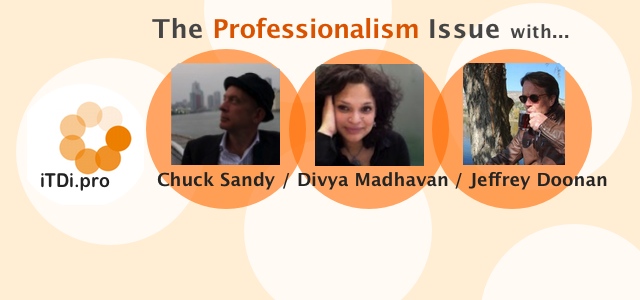Home Cooked Professionalism – Chuck Sandy

“You thought you knew what food was” but “forgot how much restaurant there was in restaurant food and how much home was in homemade,” writes novelist Jonathan Franzen in The Corrections, a book that is not about food at all, nor about teaching, although it is about learning: learning to see what’s truly important as one strips one’s life of self-deception, denial, gloss, and illusion. In some way, I’ve come to see that making those same sorts of corrections in their lives and in their teaching is what the best teachers do as they progress through their career, becoming as they do, increasingly less restaurant and more homemade.
When I first started out as a teacher, I had a pretty clear idea in mind of what professionalism meant and what good teaching was, but I was all restaurant in those days: full of theory, full of dogma, full of myself. Like most new teachers, I hid behind the safety-net such things provide and while I probably taught lessons that were technically proficient, I’m not at all sure how much I taught anyone.
Still, each day I’d dress up like a teacher, show up on time with the lesson plans I was required to submit to my supervisor, and teach from those lesson plans without veering far from the script I’d prepared. Meanwhile, I began subscribing to the best professional journals, started presenting at conferences, and before long had become the supervisor that other teachers submitted their lesson plans to for approval. This is when things got both better and worse.
Clearly, I was on a fast-moving professional track, and in terms of career, this was very good. Before too many more years went by, I was writing textbooks and traveling at my publisher’s expense to tell teachers near and far what good teaching is and why they should get on with it. Back then, it was all about the Communicative Approach, which at that time had become almost a religion in English Language Teaching, because if teachers weren’t Communicative Approach teachers, then what were they? They were holdouts and traditionalists, doing it all wrong. They weren’t of course, but I thought they were, and in the name of professionalism I worked to convince them that they were, and that’s not just bad, that’s very wrong.
I cringe when I think now of how what I was actually doing was working to take the home out of homemade teaching and replace it with a corporate, mass-produced version of chain-restaurant education … in the name of professionalism. To make things worse, most of my ELT heroes in those days, the true professionals, I thought, and the ones I aspired to be more like, were those people doing the same things I was doing, only more of it, more dogmatically, and more successfully.
Well, that was twenty years ago, and all I can do now is apologize and say I was wrong, while also working to correct those wrongs, correct and better myself, and offer up a totally revised definition of professionalism along with a new, much more authentic group of heroes: the working-dedicated-to-learning-how-to-be-better teachers in the international teaching community.
Today, the most professional teachers I know do not often teach in universities, publish paradigm-shifting textbooks, write many academic articles, or strive to do much more than become great teachers while actively encouraging their peers to do the same. They openly share what they’re learning on blogs and social media posts. They voluntarily serve as mentors to newer teachers with the idea that by doing so they’ll be learning something new about teaching as well. They initiate collaborative projects that they invite others to join as equals, get involved in initiatives like ELTChat and organizations like iTDi, and enthusiastically embrace opportunities to grow professionally. My new heroes are the teachers who exemplify this spirit of a new home-cooked professionalism and often write of it so beautifully as James Taylor does here his blog post entitled Just Say Yes.
Then, there are those teachers who take stands against movements and pedagogies in education they believe are damaging. My new heroes are also the ones who feel so strongly about education that they wind up resigning from very professional positions in order to fight for their students. These are teachers like Meg Norris who writes about this in her post, To My Students: I Love You and I Believe In You.
And then, there are teacher heroes like Kiran Bir Sethi who not only believe they can change the world, but do change the world with a movement like Design For Change which began in a single classroom in India five years ago and now involves over 35,000,000 students and their heroic teachers in more than 24 different countries.
Not long ago, Kiran told me that one of the reasons she believes Design For Change spread so quickly is because “when people contacted us wanting to bring Design For Change to their own country, we replied immediately, let them know they’re part of a larger idea, explained why they should do it, not how they should do it, and made them partners. We want them to be able to say, ‘This is now our story, not Kiran’s story anymore’ and this is an important concept.”
What I believe Kiran is saying here is that she created a structure and an approach that encouraged teachers to put more home in homemade, while not requiring them to be restaurant at all. Then, she stepped back and let them get on with it.
Notice how different this approach to professionalism is from my 20-years-ago-do-it-my-way-chain-restaurant-version. Notice, how different James Taylor’s vision is. And then there’s Meg Norris out there fighting for her students’ rights. Notice now this sort of professionalism is mostly about heart and hardly about self.
Home-cooked. Filled with heart. Focused on others. Giving more than getting. That’s the sort of professionalism I now believe in and try my wavering best to live by.
Connect with Chuck and other iTDi Associates, Mentors, and Faculty by joining iTDi Community. Sign Up For A Free iTDi Account to create your profile and get immediate access to our social forums and trial lessons from our English For Teachers and Teacher Development courses.







